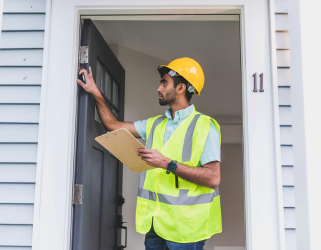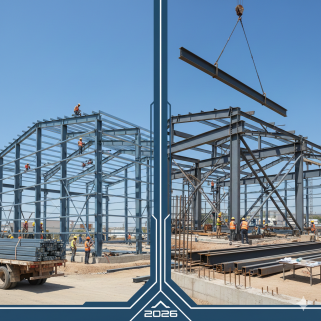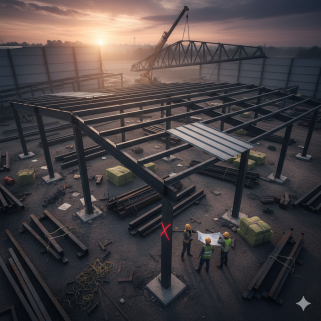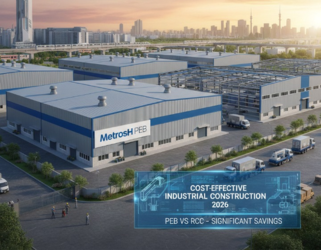The Importance of Quality Control in Civil Construction

Quality control in civil construction serves as the backbone of any successful project. It ensures that every stage of the construction process meets predefined standards, resulting in safe, durable, and efficient infrastructure. From skyscrapers to roadways, implementing stringent quality measures is essential to maintain structural integrity, prolong project lifespan, and protect resources. This blog dives deep into the significance of quality assurance in civil construction and the steps required to achieve it.
Why Quality Control is Crucial in Civil Construction
1. Ensuring Safety
The primary reason for focusing on quality control in civil construction is to ensure safety. A structurally unsound building, bridge, or dam poses significant risks to human life and investments. Adherence to civil engineering quality standards guarantees that materials, construction techniques, and designs align with safety protocols.
2. Meeting Regulatory Standards
Construction projects are subject to stringent regulatory requirements. Failure to comply can lead to fines, project delays, or even shutdowns. Quality assurance systems help builders meet these benchmarks, ensuring compliance with both local and international laws.
3. Enhancing Project Durability
Durability is a key parameter for any infrastructure. Sub-par materials or shortcuts during construction can cause premature degradation. Quality control measures ensure that projects use superior materials and methods, maximizing the lifespan of the structure and minimizing maintenance costs.
4. Maintaining Reputation
Builders, contractors, and developers rely on their reputation
to secure future projects. Construction site quality control plays a pivotal role in delivering high-caliber results, which in turn bolsters credibility and trust in the industry.
Core Components of Quality Control in Civil Construction
1. Material Inspection
Quality begins with the selection of construction materials. Regular testing and evaluation of cement, steel, concrete, and aggregates help ensure they meet project specifications. This is essential for adhering to civil engineering quality standards and guaranteeing structural reliability.
2. On-Site Supervision
Construction site quality control includes vigilant on-site supervision. Engineers and inspectors review every phase of the project, from foundation laying to finishing, thereby mitigating risks and resolving inefficiencies in real-time.
3. Testing and Calibration
Testing is at the heart of construction quality assurance. Non-destructive tests (NDTs), soil analysis, and load tests allow engineers to monitor structural performance. Regular calibration of machinery and equipment further ensures that construction activities meet precision requirements.
4. Documentation and Reporting
A robust documentation process is key to maintaining construction quality assurance. Thorough records of inspections, test results, and quality audits provide a clear picture of compliance and help in future troubleshooting.
5. Skilled Workforce
Using a skilled and experienced workforce is non-negotiable. Quality control depends on properly trained professionals who understand and execute civil engineering quality standards effectively.
Latest Trends in Construction Quality Assurance
1. Digital Tools for Quality Monitoring
The future of construction site quality control lies in technology. Tools like drones, 3D laser scanning, and real-time monitoring software enable precise evaluations. Builders can now identify cracks, uneven load distributions, or weak spots without relying solely on manual inspections.
2. BIM Integration
Building Information Modeling (BIM) is revolutionizing quality assurance. BIM helps simulate various construction phases, root out errors during the design stage, and keep the project on track with high accuracy.
3. Sustainability in Quality Control
Sustainability is becoming an integral part of quality control in civil construction. Builders are evaluating recycled materials and eco-friendly alternatives to ensure that projects meet both performance and environmental benchmarks.
Best Practices for Construction Site Quality Control
- Clear Quality Policies
Define your quality policies and communicate them to all stakeholders, including team members, contractors, and suppliers. - Regular Audits
Schedule routine audits to identify deviations from civil engineering quality standards and address them before they escalate. - Training Programs
Continuous education and training opportunities for workers and engineers help maintain top-tier construction quality assurance practices. - Prompt Issue Resolution
Establish a system for resolving quality issues quickly. Early intervention reduces project delays and additional expenses. - Third-Party Assessments
Leverage independent auditors or consultants to provide an unbiased perspective on the construction site's quality standards.
The Role of Quality Control in Sustainability
Modern construction projects are increasingly focusing on environmentally sustainable practices, and quality control is integral to that vision. For instance, adhering to eco-friendly standards in material usage minimizes environmental damage. Similarly, efficient construction methods aligned with civil engineering quality standards reduce waste, energy consumption, and carbon footprints.
The Metrosh Advantage
As the civil construction industry evolves, the importance of quality in construction remains paramount. Metrosh has established itself as a trusted leader in maintaining stringent quality controls. Specializing in the manufacturing, supply, and erection of pre-engineered steel buildings, steel girders, foot over bridges (FOB), road over bridges (ROB), and limited height subways (LHS), Metrosh ensures that every project meets the highest industry standards. By blending innovation with experience, Metrosh continues to set benchmarks in quality and reliability.
Quality control is not just an operational necessity; it’s a commitment to excellence. When executed correctly, it empowers the construction industry to build resilient, efficient, and sustainable infrastructures for the future.
FAQs
1. What is quality control in civil construction?
Quality control in civil construction involves monitoring materials, processes, and designs to ensure projects meet safety, durability, and regulatory standards.
2. Why is quality control important in civil construction?
It ensures safety, enhances durability, and reduces risks, fostering trust, compliance, and cost-effective project execution.
3. What are the common quality control processes used in construction?
Key processes include material inspections, on-site supervision, testing and calibration, documentation, and regular quality audits.
4. How does quality control affect construction safety?
It minimizes risks by ensuring proper materials, adherence to design standards, and regular oversight of construction phases.
5. Who is responsible for quality control on a construction site?
Engineers, project managers, and quality inspectors collaboratively ensure compliance with quality standards on-site.
Related Articles

PEB vs Traditional Steel Structure: Which Is Right for Your Project in 2026?
14 Jan 2026
Hybrid Construction vs Traditional Construction: Cost, Time & Sustainability
14 Jan 2026
Top 7 Mistakes to Avoid When Planning a Pre-Engineered Building (PEB)
14 Jan 2026
Best Practices in Civil Construction Safety
14 Jan 2026
Benefits of Hybrid Construction in Modern Infrastructure Projects
14 Jan 2026


